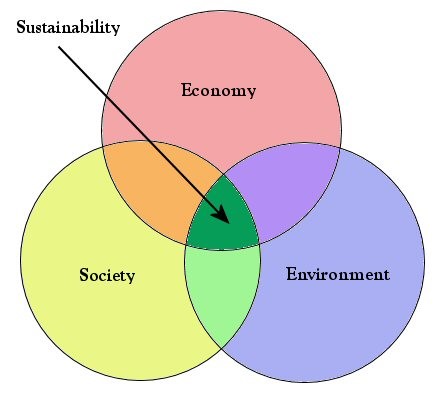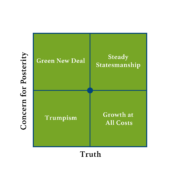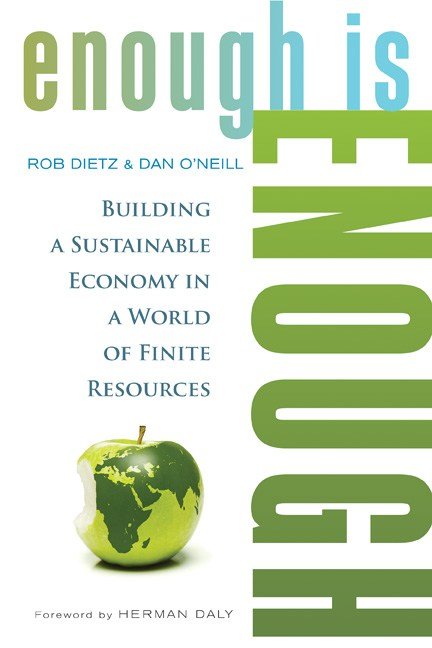Social Justice in the Steady State
By Brian Snyder
It is a luxury to be able to worry about future generations, biodiversity loss, or climate change, and it is only available to me because of a great deal of privilege. I don’t have to worry about affording food for my family, or finding a safe place to live, and I’m confident that my kids will inherit much of the same bourgeois life that I did. My privilege frees me to think, worry, and write about the environment, energy, and economic growth. However, in all this self-important thinking about the Anthropocene, it can be easy to forget that the USA, and the rest of the world, is already in severe political and environmental danger. It is easy to forget that the hellscape I worry about future generations inheriting is not dissimilar from the daily experience of billions of people currently living on Earth.

It’s time to rethink the sustainability Venn diagram. How do we ensure that social justice is not viewed as a third wheel? (Image: CC BY-SA 3.0, Credit: Sustainability Hub)
This critique about environmental concern—that it ignores the suffering of the present to replicate a prosperous life for the wealthy—is not new. However, the protests convulsing American cities should be a wakeup call for folks like me who tend to be more concerned about long-term sustainability than short-term justice. There are morally compelling issues of injustice happening right now, and any solution we propose to address long-term ecological crises must explicitly address these immediate issues as well.
Just as this critique of environmentalism isn’t new, neither is the observation that “sustainable” solutions must be socially just. Indeed, this linkage is often expressed as a Venn diagram of overlapping “social,” “environmental,” and “economic” circles. In my experience, those of us concerned about sustainability tend to focus on the economic and the environmental and minimize the importance of the social. The social circle is often seen as sort of a third wheel, something we should be mindful of, a side effect of a well-designed policy perhaps, but not the goal of sustainability. It feels tacked on.
No Sustainability Without Social Justice
However, building a socially just society is every bit as critical to sustainability as maintaining natural capital or ending overconsumption. A sustainable system requires social justice, but not just because it is in the Venn diagram. Without a socially just system of government and equitable treatment across race, gender, and class, we will not have a stable, sustainable socioeconomic system.

Black Lives Matter demonstrations are subtly congruent with advancing the steady state economy. (Image: CC BY 2.0, Credit: Fibonacci Blue)
Imagine a steady state economy, but one in which some people are born into generational poverty or otherwise unable to provide meaningful, healthy lives for themselves. In such a world, this hereditary underclass will oppose the sociopolitical system and the policies that limit economic growth. From their perspective, the planet may be sustainable, but they remain impoverished and marginalized. Such an economic system will fail due to internal strife.
Thus, we should see the current protests for criminal justice and police reform as a core component of the movement toward a steady state economy because social justice is a prerequisite of sustainability. A common protest sign reads, “No Justice, No Peace.” We could modify that to read, “No Justice, No Sustainability,” and it would remain true. If we cannot figure out how to end racial discrimination, and particularly racial economic inequality, we will not build a sustainable environment.
In other words, the Venn diagram concept of sustainability is short-sighted. There are not three separate but overlapping circles of social, economic, and environmental solutions, but a single circle in which social justice, economic efficiency, and environmental sustainability must be simultaneously solved.
Or perhaps sustainability is more like a Rubik’s cube. In a Rubik’s cube, if one side is wrong, the problem is not solved. Sustainability is likewise; if one systemic issue is not solved, nothing is solved. A steady state economy in a racist society is as useless as a half-solved Rubik’s cube.

The steady state economy as a Rubik’s cube. All sides must be solved to achieve equality and sustainability. (Image: CC0 1.0, Source)
This is both good and bad news. It is bad news because those of us who are concerned about environmental sustainability must consider another universe of problems when one universe is already overwhelming. But it is also good news because it highlights the systemic, ethical nature of the problem. Perhaps getting the ethics right will solve problems in each universe.
We often get the impression from media and academics that we are just an innovation away from solving our environmental problems. Sometimes, we are told that if we increase renewable energy use our struggles will fade away; other times, carbon dioxide removal or geoengineering is the solution. While I do not intend to denigrate those ideas, they will not fix systemic environmental problems caused by economic activity and human greed. A new invention will not change the 2nd law of thermodynamics, but a new ethical framework might change our avarice.
Our allies protesting for social and racial justice have a similarly daunting ethical problem. It appears that our ethnocentrism and xenophobia is as hard-wired as our greed. While criminal justice reform is needed, public policy will not solve millennia of racism and xenophobia. Only a cultural and ethical change can move society toward a post-racist future. As in our environmental crises, there is no easy fix.
Sustainability, Social Justice, and the Golden Rule
Yet, because our environmental and social problems are fundamentally ethical and cultural, the good news is that fixing one will likely fix the other. Any coherent ethical philosophy that favors social and racial justice will also favor sustainability and vice versa. This occurs because social justice and sustainability are applications of the Golden Rule, the precept in every major world religion that one should treat others as they would like to be treated. Social justice is based on the idea that societies and governments are responsible for following the Golden Rule, and sustainability is simply the application of the Golden Rule to future generations. Thus, a socially just society is one that treats its current citizens by the Golden Rule, and a sustainable society is one that treats its current and future inhabitants by the Golden Rule. As a result, if we move toward a more socially just society that implements the Golden Rule across its contemporary population, we are likely to pursue a more sustainable society that expresses the same ethic to its future population.
Perhaps we should see the protests for social and racial justice as the start of a movement that may be more significant than ending police brutality. The extraordinary progress toward sustainability made in the 1960s and early 1970s did not begin with the publication of Silent Spring or the Cuyahoga River fires. Instead, it emerged from the unrest and uprising of the civil rights and anti-war movements. Without those larger social movements to galvanize and educate people, elect new leaders, and, most importantly, change the ethics of American society, we may never have passed the Clean Air or Clean Water Acts. We might imagine that something similar could happen half-a-century later, and as we solve one side of our Rubik’s cube, the other sides will fall into place too.
 Brian F. Snyder is an assistant professor of environmental science at Louisiana State University and CASSE’s LSU Chapter director.
Brian F. Snyder is an assistant professor of environmental science at Louisiana State University and CASSE’s LSU Chapter director.






May I respectfully disagree with your entire premise. Social justice is necessary but not sufficient to save the planet. However, carrying out the reforms needed to save the planet will in fact require massive changes in our institutions, behavior and culture, and it is these changes that will make social justice more achievable. But the reverse is not true. A society that prioritizes social justice will not automatically bring about the changes needed to save the planet. Most important, whoever runs the government (or other institutions) will impose its OWN vision of what changs are needed and how to accomplish them. In the case of social justice, it is the citizenry that must make these changes and decide on public policy. But making policy decisions that rely on science (which is impartial and nonarbitrary) cannot and must not defer to political ideology, even when that ideology seems progressive or desirable. What is missing in contemporary progressive and left ideology is the
planet and its ecosystems and species. Without putting these first, as the foundation of public policy, we will remain paralyzed and in perpetual
political conflict. The social justice movement has sidelined ecology and planetary health and regards these as afterthoughts, not as the
criteria on which human civilization rests. Without an ecological vision and principles for policy making and action, we will never overcome the
obstacles we face. The failure of the social justice movement to educate itself and to join rather than scold the environmental activists is right now the biggest obstacle we face. For fifty years I have watched as the left and the SJW excoriated white middle class activists and their
campaigns, often lashing out with hostility and unfounded accusations. It is time for them to look deeply into their mistakes and failures, and to join the overarching challenge to save the planet. Without this unity and without the guidance of science and reason, we are all doomed.
Hi Lorna,
Thanks for your thoughtful comment. I do think that social justice is sufficient to save the planet, but perhaps we define social justice differently. To me, social justice includes intergenerational justice. Thus, to say we are socially just is to say we are intergenerationally just, and to say we are intergenerationally just implies that we have a stable biosphere.
If you define social justice as limited to currently living people, then I would agree that social justice is necessary but not sufficient to save the planet. We could then have a socially just utopia yet still live unsustainably. However, I would argue that such a definition is a bit nonsensical because to me, social justice is an extension of the golden rule. How could we want others to be treated as ourselves, but limit that to only those others currently alive in 2020?
Thanks for reading and commenting!
The US itself alone nor even when placed in its continental niche alongside the other niches of this planet is not a Rubik’s Cube, nor is it a Venn Diagram. Your academic envelope with its insider lingo of abstract problematization derived from some French nihilists whose 1968 revolution failed is privileged indeed to incite a race war and anarchy by this kind of absurd spilling of pompous deranged Left rhetoric. BLM is not about black lives, but it is an inflammatory provocation directed against an orderly efficient society of laws, with police being the thin blue line that has to struggle against a ghetto culture that is violent in its flaunting of law. There are many injustices in our cities but the main one that is purposely being defended by its going unmentioned is the drug-driven economy of all of our ghettoes, where the chief instruments of violence are young black men shooting and killing other black men. antifa and BLM and the deranged NYT are all complicit in the injustice of those deaths and the devastated lives they affect by pushing aside any focus on the horrific chaotic environment of our cities’ self-destructing ghettoes. The drugs come into the cities where our “professionals” like you in the academy, and also in bureaucracies of govenrment aladministration and the courts are either users or silent about the drugs circulating about them. Don’t confuse your Leftist ideological ‘social justice with furthering a constriction of the very elements whose powers will be even more sorely tried as the economic war and the disinformation war that have been concomitant with the biological war that China released on the West continue. You see China doesn’t give a fig for your social justice nor will it take a place in your Rubiks cube abstraction of a new world order.
I think you are quite mistaken and have bought into some misinformation. We live in a white supremacist culture with white supremacists enforcing racism. Racism is a mental problem, it is an emotional attachment to ignorance based on fear. The eruption of anger over the summery execution of non-threatening people has exploded and the 10s of thousands of white people who poured out into the streets during a pandemic, risking their lives to express their outrage at such unwarranted state violence.
We live in a society with institutionalized usury. The Greens have argued over the social justice/environmental divide for years. I think they do need to go hand in hand but Lorna makes a good point. I think there is a connection but as Lorna points out it is pretty much ignored by the left. That connection is the money and by that I mean power, the power to direct public policy. I think the monetary system is what system’s analysts call the “leverage point” in the economic system, that point at which a small change can transform the whole system. The reason why I think it is important to both social justice and environmental justice is not only the physical reality of eliminating the gross injustices of usury but the psychological consequences as well. Those consequences in this system are negative for both individuals and society influencing people toward non-cooperation, competitiveness, lack of care, basically. I believe a sovereign money system would reverse such psychological influences and incentives. I think the positive influence of a sovereign public money system where money is created based on equity instead of debt and spent into the productive economy, as well as giving at least 25% of all new money to states on a per capita basis, as the NEED Act proposed, would create an Economics of Care that would institutionalize the golden rule.